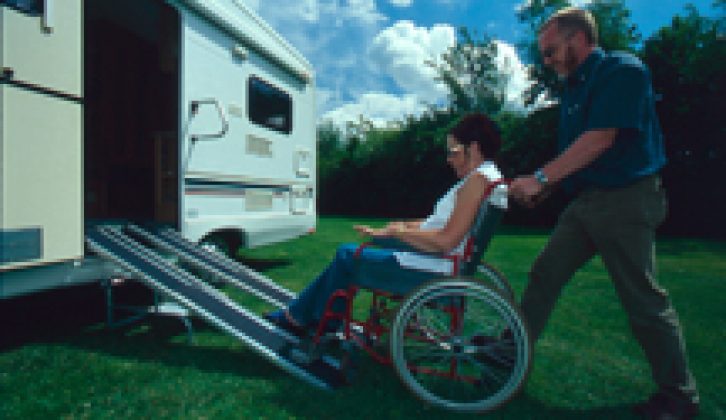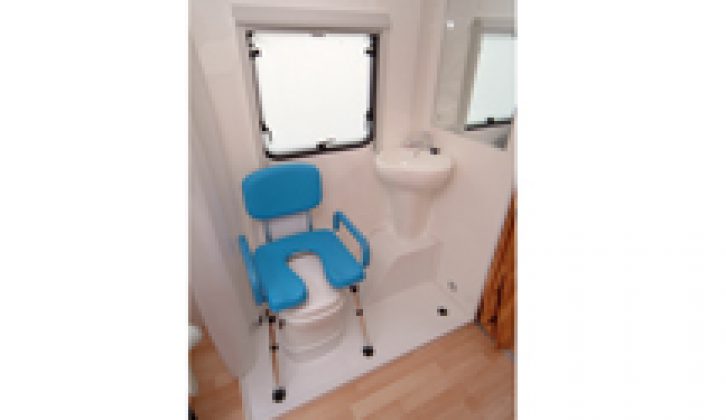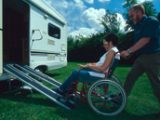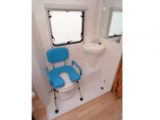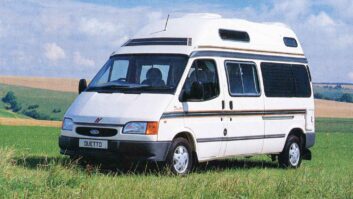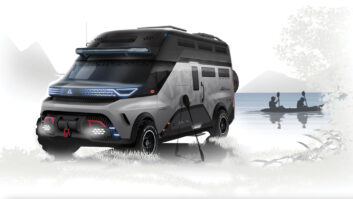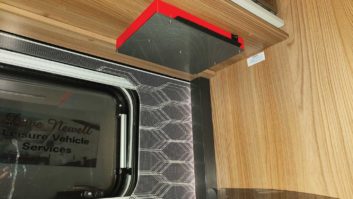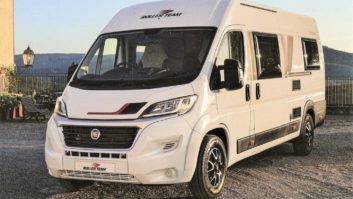If you’re disabled, motorcaravanning can be a wonderful way to broaden your horizons, and it’s easy to get started. Here are some tips and sound advice to get you going.
- When it comes to buying a new motorhome, choose the smallest vehicle with which you’re comfortable, rather than the biggest you can afford. Make sure you have room on your driveway to park it, too.
- If you are normally dependent on a wheelchair, you don’t need to pay VAT on the purchase of a motorhome that has been adapted to suit your needs and is for your personal use. All parts and subsequent servicing are also VAT-exempt. (For more information on this, phone the VAT Enquiry Line 0845 010 9000.) In addition, the zero-rating of VAT has been extended to cover used specially adapted vehicles.
- Consider how your physical condition or family circumstances might alter in the years to come, and buy with this in mind.
- Elevating-roof campers are generally unsuitable for motorcaravanners with a disability. High-top panel van conversions are often better: most have a large, sliding door on the nearside so getting in and out is not too hard. There are also many bespoke motorhome builders who will undertake a conversion to your exact requirements.
- Larger coachbuilt motorhomes (either overcab or A-class) make a good alternative. Although their caravan doors often need to be adapted, this is very often not a problem – many manufacturers offer such adaptations as an option, or alternatively your dealer or local coachbuilder can do it.
- Ramps and lifts can be fitted easily, as can a wheelchair-restraint system (although many may prefer to use the motorhome’s travel seats). If you do need a hydraulic lift, it must be equipped with fail-safe technology.
- [tl:gallery index=1 size=216×129]Do not buy any motorhome without first assessing accessibility to the washroom.
If you have a carer to assist you, it is even more important.
- If you have arthritic hands, monobloc lever taps (where one lever controls both flow and temperature) are essential.
- If you are a wheelchair user, you’ll find it easier to push your chair over vinyl flooring rather than carpets or rugs.
- Many motorhomes are available with automatic or semi-automatic gearboxes, including Renault, the Ford Transit, Fiat Ducato, Mercedes Sprinter, and VW Transporter. Many US RVs have auto gearboxes, too, but these are usually for left-hand driver versions only.
- You can automate a manual gearbox using a system such as Auto-Clutch (contact Vehvac: tel 01732 868080; web www.vehvac.co.uk), which is useful if you only have one ‘good’ leg: you change gear as normal but instead of depressing a clutch pedal, you push a button on the gearknob instead).
- Finally, don’t be inhibited – just do it. You have nothing to lose, and much to gain!
Useful contacts
- Coachbuilt GB (024 7630 4754, www.coachbuiltgb.co.uk)
- Nirvana RV (0800 328 1475, www.nirvanarv.com)
- Roy Wood Transits (0118 979 0060, www.roywoodtransits.co.uk)
Manufacturers/Converters
- Leisuredrive (01204 574498, www.leisuredrive.co.uk)
- Middlesex Motorcaravans (020 8952 4045, www.leisuredrive.co.uk)
- Nu-Venture Campers (01942 238560, www.nuventure.co.uk)
- Nu-Venture Motorhomes (01942 494090, www.nuventure.co.uk)
- RS Motorhomes (01709 891110, www.rsmotorhomes.com)
- SC Sporthomes (01633 862419, www.scsporthomes.com)
- Warrior Motorhomes (01482 797001)
- Wentworth Conversions (01784 433081, www.wentworthmc.co.uk)
- Young Conversions (01908 639936, www.youngconversions.com)
